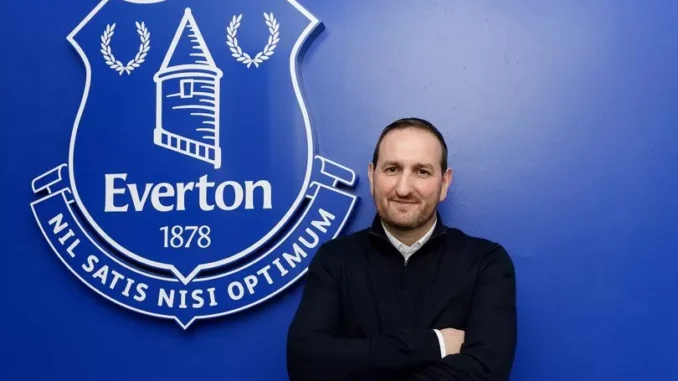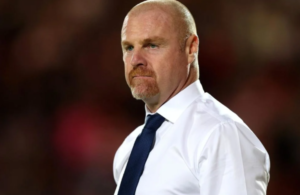
Inside Kevin Thelwell’s Everton project as glimmers of hope emerge amid the chaos
Joe Thomas, the Everton FC correspondent, examines Kevin Thelwell’s influence, responsibilities, and goals as he approaches his second year as the Blues’ director of football.
It would be an understatement to say that a lot has transpired in the two years since Kevin Thelwell joined Everton.
He was appointed prior to the team going through two traumatic relegation battles, by a board that no longer exists, and above a manager who is no longer employed.
When trying to evaluate his 24 months in command, the fact that he has presided over two survival bouts and might be in the middle of a third could make for an unsettling first impression.
However, context is important as always. Thelwell’s job as director of football is to lead a team.
Two years ago, Everton was a different team. As Thelwell adapted to life at Finch Farm, he told the club’s media that he could smell the “positivity” in the air. It was hoped that then-manager Frank Lampard would instill confidence in a team that had been left in disarray following the last stages of Rafa Benitez’s brief tenure.He declared at the time, “I’m so happy to be joining Everton and to have the opportunity to play a part in the club’s ambitious journey,” and he “could not wait” to assist the team in moving forward.

Even though there would be harsh upheaval in the near future, the club’s initial pitch revolved around the board-led strategic assessment that was started after the departure of Marcel Brands, Thelwell’s predecessor, and the new pathway its two highest profile appointees – Lampard and Thelwell – would lead it down. Even after that first relegation fight strands of positivity were entwined within the narrative around the club. Lampard had brought the supporters with him and reaped the benefit as they pulled his team through major victories against Chelsea, Leicester City and, of course, Crystal Palace.
If the chaos seemed to have generated opportunity, the environment at Everton a year later could not have been more dissimilar following a demanding campaign that culminated in yet another demanding survival battle that continued into the final week of the season.
After a span of eight months, the “noise” surrounding the Blues has only grown more intense. Following two accusations of breaking league spending regulations, there was a 10-point deduction that was later lowered to six points on appeal. There is also uncertainty due to the possibility of future reductions and a blocked takeover.
In light of this, Thelwell’s goal of “moving Everton forward” has taken numerous hits. For many, success would be defined as just staying afloat during those turbulent times. And Thelwell has gone above and beyond.

The fact that Thelwell made his greatest call correctly may be the best place to start when evaluating his performance thus far. The Lampard era came to an end just over a year ago, with the team struggling both on and off the field and spiraling towards relegation. Halfway through a January transfer window, the club found itself back in the same predicament as when Benitez left in early 2022, managerless and the senior group utterly lacking in confidence and form. Differing views on Lampard’s replacement typified a hiring process that nearly resulted in Marcelo Bielsa. Sean Dyche was the outcome, though, so few could today argue against the sense of that decision. In addition to leading the team to survival, Dyche has subsequently led Everton to a mid-table performance after two thirds of this campaign despite seeing his team weakened in the summer, addressing the abysmal away form and injecting resilience and belief into a fragile dressing room. Without the points deduction, this season would be one of emphatic, undeniable progress.
That Dyche has been able to make progress after inheriting a squad shorn of Anthony Gordon days before his arrival and following a summer in which he lost one of his most trusted players and his most promising academy product on the final day of the window – then another first team option in Demarai Gray days later – only makes this feat more impressive. Dyche was the right call.
His accomplishments shed light on the environment in which Thelwell has had to work. And Dyche, who has experienced the same reality, is well aware of this. “I think he is open minded, I think he is reality-bound in the truth of the moment,” the manager stated this week of Thelwell. In light of the current state of the club and our mutual efforts to strike the best possible agreements for it, I believe we are both adept at that. We also strive to strike a financial balance and collaborate with me to maintain a competitive edge while reducing the financial burden on the organization. We are attempting to get through a very trying time while handling a very difficult circumstance. and he’s not just having fun.
Since arriving from New York Red Bulls he has been more crisis manager than director of football, having to adapt to changing styles of management, slash the wage bill and maintain a side that can be competitive when having little choice but to sell the club silverware whenever a serious bid materialised. Thelwell’s first major transfer saw star player Richarlison sold to Tottenham Hotspur in a last-gasp – and failed – bid by the club to comply with Premier League spending rules. That the first man in through the door was James Tarkowski n a free is a fitting symbol of his two years in charge. Tightened pursestrings led to more savvy recruitment, but also to an attempt to create a team of resilience and leaders on a strict budget. Tarkowski has been central to the side since his arrival and is now Dyche’s leader on the pitch.
There are still concerns within the fan base regarding some of the transfer transactions that Thelwell has managed. Successes like Dwight McNeil and James Garner contrast with Neal Maupay’s difficulty to make an impression on Merseyside, especially in situations where a striker was needed to support Dominic Calvert-Lewin while he recovered from a protracted injury. While he hasn’t scored since December, Beto’s presence has at least allowed Calvert-Lewin to regain consistent fitness, so perhaps that will help.

Supporters also point to the January transfer window of 2023 as a concerning time under Thelwell, as Everton was clearly in need of reinforcements yet concluded the month with Gordon sold. However, the broader context in which he was working evidently caused challenges, and the club’s financial records from that January and the previous summer are currently being examined by the second Premier League probe.
It seems evident that Thelwell has conducted himself sensibly and cautiously in all of his interactions. Targets have been chosen based on how they will improve the squad. When it is feasible, players who have the potential to advance within the organization and increase in value have been signed, such as Onana and more recently Youssef Chermiti.
Thelwell has emphasized sustainable trade as a key component of the strategy, which was guided by a recruitment staff that had found a number of outstanding players the club should pursue. Under better circumstances, Mohammed Kudus, who was about to join on loan with a meager option to make the deal permanent in the summer under Lampard, might well be a member of Everton’s squad presently. The 23-year-old was removed off the market when his Ajax teammate Antony was purchased by Manchester United in a big deal that caused the Dutch team to become reluctant to part with another attacker so late in the window. This move came after the team had experienced a disastrous start to the season. Taking advantage of his fresh opportunity, he excelled in the Champions League.
Such missed opportunities are frustrating for a team that is operating within strict parameters but still feel they have been competitive – for instance securing Arnaut Danjuma and Jack Harrison on loan deals this summer, believing them to be among the best attacking options available to the Blues and striking agreements in the face of stiff competition from rivals.

Thelwell is in charge of several structural improvements, the recruitment team under Dan Purdy’s direction being one example. He and the club believe these changes will lay a strong basis for success in the long run. In the midst of significant changes at Finch Farm, Thelwell has oversaw the hiring of dozens of new employees, choosing ambitious and dedicated individuals who he feels can contribute to the development of an identity, culture, and spirit that permeates the football operation. Examples of this include the hiring of Purdy as head of recruitment and Gareth Prosser as director of the academy. There are four “strategic pillars” that Thelwell has identified to support his plan, which he is now working through a 120-point checklist of adjustments created during his early months in Halewood: who we are, how we play, how we support; and staff development.
His ambition is to forge a unit in which specialists are appointed to various roles and given the support needed to make the most of their expertise. Rather than appear as “rainmaker” – to use a term Thelwell himself regularly adopts – his preference is to act like the conductor of an orchestra, providing direction to those around him rather than sitting at the top of a hierarchical structure.
One key area Thelwell has ambitions for is the academy. His long-term aim is to have a common style of play running through the Finch Farm set up and for youth players to have a clear pathway to the first team. There has been mixed success with this so far. Opportunities have been limited and the club has lost major talent in the past 12 months. Central midfielder Isaac Price turned down a new contract seeking first-team football on the continent, striker Tom Cannon enjoyed success on loan at Preston North End but was sold to Leicester City late in the summer and England youth international Ishe-Samuels Smith, one of the academy’s most promising starlets, moved to Chelsea. These moves were partly driven by circumstance – Everton have been fighting for survival for two years, creating pressure that made it difficult for managers to give young players first-team minutes. That backdrop limited opportunities for ambitious players like Price and those who could have potentially moved up like Cannon. But another strand of Thelwell’s project was to ensure the Blues made the most of selling starlets whose pathways may have been blocked and, at a time of financial stress, the likes of Cannon and Samuels-Smith, as well as Ellis Simms, have earned the club precious cash. The result is the senior academy sides, including the Under-21s led by another highly-thought of Thelwell appointee in Paul Tait, have been hollowed out. But that does mean some of the younger players have been exposed to higher-level competition and players like Francis Okoronkwo, Harrison Armstrong and Sean McAllister have all stepped up in the process.
Meanwhile, Jenson Metcalfe and Mackenzie Hunt, though yet to make an appearance, have repeatedly been exposed to Premier League matchday squads while Lewis Dobbin, after impressing in pre-season, has progressed further and scored his first senior goal in the home win over Chelsea.
Any assessment of youth development under Thelwell cannot ignore the remarkable rise of Jarrad Branthwaite either. His breakthrough season in the Premier League has brought him to the attention of Real Madrid, Manchester United and England manager Gareth Southgate. While Thelwell’s role in his progress may not initially be clear, it was he who re-negotiated the terms of his loan deal with PSV Eindhoven last season in a bid to provide him with greater exposure to first-team football. When his chance came he flourished in the Netherlands and that success led to Thelwell deciding, with others, to clear the path for him in the first team by not extending contracts with Conor Coady and Yerry Mina last summer.
Data underpins much of the work at Finch Farm, from recruitment to fitness, and Thelwell has been a major proponent of this. At times, statistics have been a source of refuge – both he and Dyche sought comfort in numbers such as xG during the difficult start to the season, when underlying performances were better than the results on the pitch. They were eventually proved right as the Blues hit form heading into the autumn and early winter. For Dyche, it is a major help that amid the chaos engulfing them both at Everton, he has in Thelwell a figure alongside who is happy to step back and view things from a wider perspective.
Prior to the Blues’ match against West Ham United, the manager of football commented on his director of football, saying of their work: “It comes down to good communication.” Although it helps if you get along and if you have some rapport, my best work is done when there is clear communication that is in line with reality and the truth. I believe that we have an open and sincere relationship since we communicate honestly, get along well, and tell each other the truth. We both agree that this needs a reality line and say, “Let’s not work in the world of myths.” However, I believe there has been some of that in the past.
The instability that has hampered Thelwell’s efforts and the fact that the majority of his approach will take years, not months, to pay off make it impossible to evaluate his achievements. His best chance to make noticeable progress, given how long he’s had to operate in an uncertain environment, may yet be this summer. The club’s primary goal for this season has been to ensure his safety early enough to give him a head start on the summer transfer market, when he may have the most latitude to make changes to the Frankenstein first team he took over two years ago and numerous large contracts could expire.
His work can only be evaluated within the parameters he has been made to work inside till then. There are hints that he is laying the groundwork for more advancement despite the disorganized headlines and uncontrollable circumstances that are preventing him from moving forward. What Dyche and the club can accomplish for him in the upcoming months, rather than what he can accomplish for them, may determine if he can capitalize on them.
Read more news on:sportupdates.co.uk

Leave a Reply